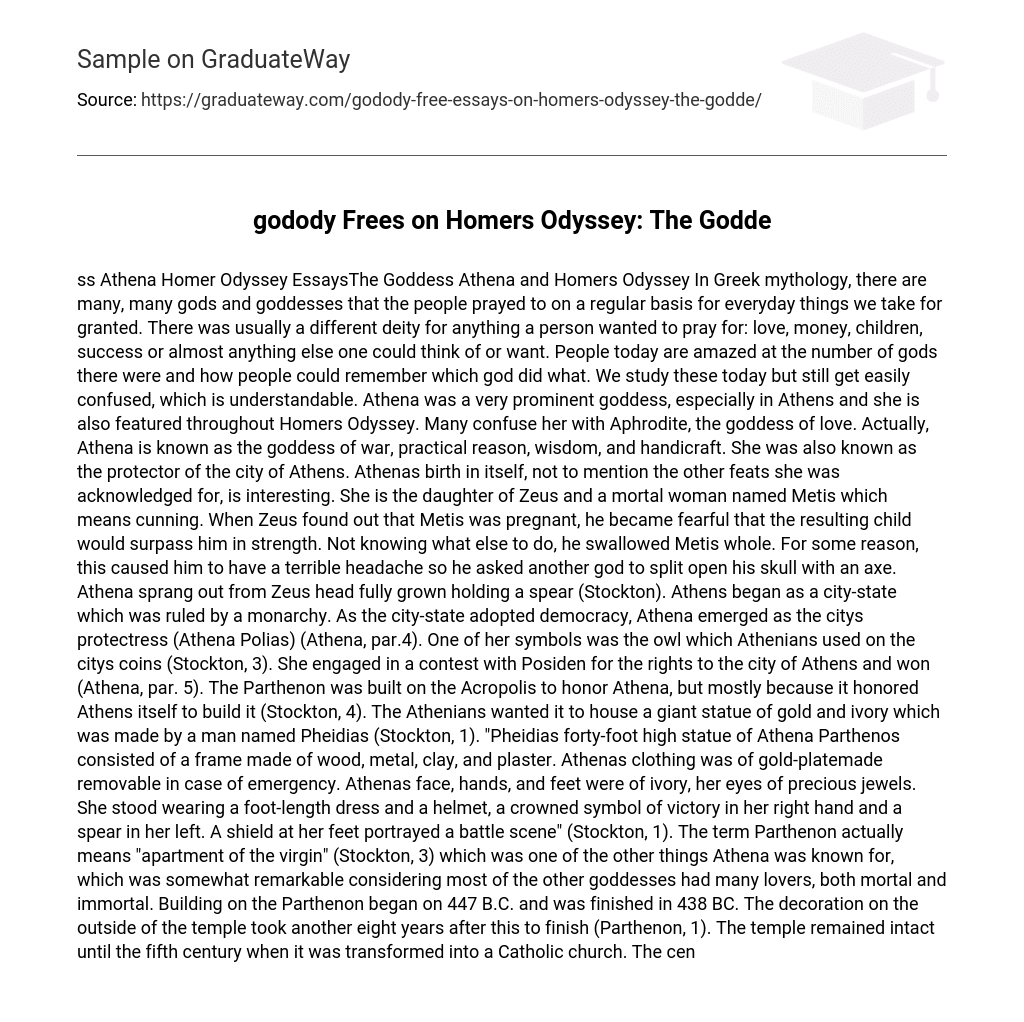ss Athena Homer Odyssey EssaysThe Goddess Athena and Homers Odyssey In Greek mythology, there are many, many gods and goddesses that the people prayed to on a regular basis for everyday things we take for granted.
There was usually a different deity for anything a person wanted to pray for: love, money, children, success or almost anything else one could think of or want. People today are amazed at the number of gods there were and how people could remember which god did what. We study these today but still get easily confused, which is understandable. Athena was a very prominent goddess, especially in Athens and she is also featured throughout Homers Odyssey. Many confuse her with Aphrodite, the goddess of love.
Actually, Athena is known as the goddess of war, practical reason, wisdom, and handicraft. She was also known as the protector of the city of Athens. Athenas birth in itself, not to mention the other feats she was acknowledged for, is interesting. She is the daughter of Zeus and a mortal woman named Metis which means cunning.
When Zeus found out that Metis was pregnant, he became fearful that the resulting child would surpass him in strength. Not knowing what else to do, he swallowed Metis whole. For some reason, this caused him to have a terrible headache so he asked another god to split open his skull with an axe. Athena sprang out from Zeus head fully grown holding a spear (Stockton). Athens began as a city-state which was ruled by a monarchy.
As the city-state adopted democracy, Athena emerged as the citys protectress (Athena Polias) (Athena, par.4). One of her symbols was the owl which Athenians used on the citys coins (Stockton, 3). She engaged in a contest with Posiden for the rights to the city of Athens and won (Athena, par. 5). The Parthenon was built on the Acropolis to honor Athena, but mostly because it honored Athens itself to build it (Stockton, 4). The Athenians wanted it to house a giant statue of gold and ivory which was made by a man named Pheidias (Stockton, 1).
“Pheidias forty-foot high statue of Athena Parthenos consisted of a frame made of wood, metal, clay, and plaster. Athenas clothing was of gold-platemade removable in case of emergency. Athenas face, hands, and feet were of ivory, her eyes of precious jewels. She stood wearing a foot-length dress and a helmet, a crowned symbol of victory in her right hand and a spear in her left.
A shield at her feet portrayed a battle scene” (Stockton, 1). The term Parthenon actually means “apartment of the virgin” (Stockton, 3) which was one of the other things Athena was known for, which was somewhat remarkable considering most of the other goddesses had many lovers, both mortal and immortal. Building on the Parthenon began on 447 B.C. and was finished in 438 BC. The decoration on the outside of the temple took another eight years after this to finish (Parthenon, 1).
The temple remained intact until the fifth century when it was transformed into a Catholic church. The center of the building was destroyed by a powder magazine explosion in 1687 (Parthenon, 2). The people of Athens held a festival every fourth year in August on Athenas birthday called the Greater Panathenaia (Panathenaea, 1). It was seen as a civic as well as religious event (Stockton, 7).
Contests involving music and athletics were held and afterwards the winners went to the Parthenon and were presented beautifully painted vases holding valuable olive oil (Stockton, 8). An animal sacrifice was offered on an alter east of the entrance to the Parthenon (Stockton, 8). Since Athena was the goddess of handicraft, every time this festival was held, Athenian women would weave a peplos (a special garment) and present it to Athenas statue. Interestingly enough, even after the gold and ivory statue was housed in the Parthenon, the peplos was still presented to an old wooden cult statue of Athena (Stockton, 8).
This was the only time that men were allowed to carry their weapons in the streets, which gives an indication of the age of the festival (Stockton, 8). In Odyssey, Athena is mentioned in almost every book. In fact, it opens with her appearing to an assembly of the gods and goddesses on Mount Olympus and pleaded for them to finally let Odysseus return to his home (Homer, 221). She appears many times to Telemakhos to encourage him not to give up on his father returning home.
She insists that he go on a journey to different areas where men who fought with his father lived to inquire about him. She helped him ready a ship and found men to sail it (Homer, 235-238). She repeatedly appears to Odysseus and helps him on his journey home. She is alongside him in strange lands protecting him from harm and making him appear more than he is so people will be more inclined to help him (Homer, 284). She also appears to Penelope, Odysseus wife, to make sure she does not lose hope and give in to the many proposals of marriage coming from the suitors who have invaded her home thinking Odysseus will never return. Apparently, Athena was seen as a very important goddess.
Conflicting literature also depicts her as the goddess skilled peacetime pursuits and righteousness along with the other things she was already known for. She was widely respected and prayed to by many people, not just those of Athens. She is depicted as one of the greater goddesses who seemed to help people more than hurt them as other goddess were known to do. Athena was basically known, however, as the city protectress and goddess of war, wisdom, practical reason and handicraft.
Works Cited “Athena.” http://www.eb.com:180/cgi-bin?g?Doc0&pt=1&sort=revelance&config=config. (2-8-99). Homer. “The Odyssey.” The Norton Anthology World Masterpieces. Ed. Maynard Mack.
U.S.A.: W.W. Norton &Company, 1995. “Panathenaea.” http://www.eb.com:180/cgi-bin/g?Docelevance&config=config&firsthit=off (2-8-99). “Parthenon.” http://www.eb.com:180/cgi-bin/g?Docelevance&config=config&firsthit=off (2-8-99). Stockton, William, and James Jackson.
“Parthenon.” http://jcccnet.johnco.cc.ks.us/~jjackson/part.html (2-8-99).





